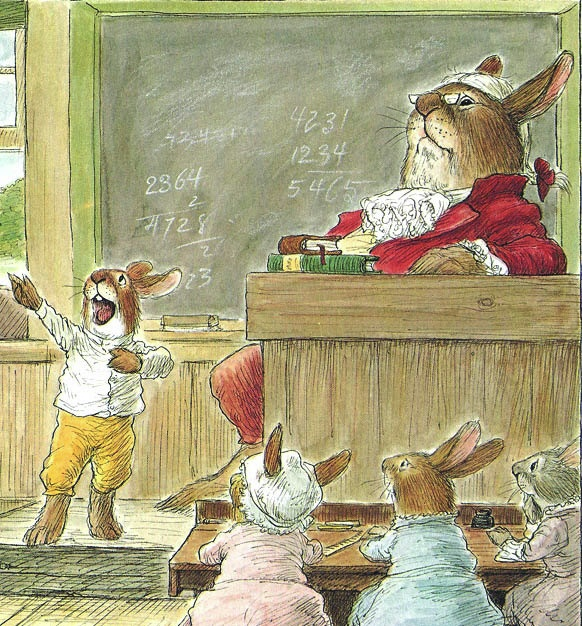An Excuse To Post Some Wallace Tripp
 HE boy stood on the burning deck
HE boy stood on the burning deck
- Whence all but him had fled;
- The flame that lit the battle’s wreck
- Shone round him o’er the dead.
-
- Yet beautiful and bright he stood,
- As born to rule the storm;
- A creature of heroic blood,
- A proud, though childlike form.
- The flames rolled on — he would not go
- Without his father’s word;
- That father, faint in death below,
- His voice no longer heard.
- He called aloud — "Say, father, say,
- If yet my task is done?"
- He knew not that the chieftain lay
- Unconscious of his son.
- "Speak, father!" once again he cried,
- "If I may yet be gone!"
- And but the booming shots replied,
- And fast the flames rolled on.
- Upon his brow he felt their breath,
- And in his waving hair,
- And looked from that lone post of death
- In still, yet brave despair.
- And shouted but once more aloud,
- "My father! must I stay?"
- While o’er him fast, through sail and shroud,
- The wreathing fires made way.
- They wrapt the ship in splendor wild,
- They caught the flag on high,
- And streamed above the gallant child,
- Like banners in the sky.
- There came a burst of thunder sound–
- The boy — oh! where was he?
- Ask of the winds that far around
- With fragments strewed the sea!–
- With mast, and helm, and pennon fair
- That well had borne their part–
- But the noblest thing that perished there
- Was that young, faithful heart.
Felicia Dorothea Hemans, 1826.
This poem refers to the explosion of the French flagship L'Orient at the Battle of the Nile, 1 August 1798. The only thing that is known for sure about this is that there was such a young man who stayed at his post despite being told to leave, he replied that he had no such orders. His death was witnessed by many English sailors.* He was supposed to be the son of the ship's captain, Luc-Julien-Joseph Casabianca, who was dead. Young Casabianca stayed at his station until the fire reached the ship's magazines, an explosion seen 20 miles away. The poem is silly in it's sentimentality and clumsy in it's construction, but its a damn fine bit of writing, God dammee if it ain't. It remained a standard for school elocutions for a century.
Wallace Tripp.
*Anyone who could have witnessed the boy die would have been vaporized in the blast. Just saying.
My illustration tomorrow.





Comments
Post a Comment